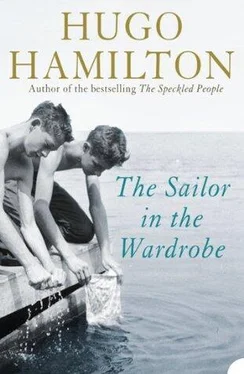Now it’s goodbye to the harbour and goodbye to the hurt mind. Packer and I are moving on. We’ve stopped hanging around, sitting on the trellis outside Dan Turley’s shed. We’ve stopped going out in boats and we’ve stopped coming home with mackerel scales on our hands. We still go down there from time to time as visitors, but we don’t work for Dan Turley any more and we don’t get paid. There was nothing said, nothing official, no formal notice, just Packer and me deciding one day that it was the end of something, the moment of departure when you move out of the present and never turn back.
It was the drowning that changed everything. After Tyrone was drowned, we began to talk about the harbour as if it was in the past, as if we were no longer part of it. When the news went around about Tyrone’s boat being found adrift one morning with nobody inside, it seemed inevitable to us, something we had quietly predicted long ago. It was the signal for us to leave. We could not help connecting it to what was happening in Ireland at the time. We heard the news on the radio every day getting worse and it sometimes looked like they were inventing new ideas for killing, new violence that had never been thought of before. It was bad justice all around. Internment without trial. Torture in police stations. People talking about the occupation and trying to balance up the justice gap with more injustice on all sides. Soldiers killed in roadside bombs. UDR men assassinated on their farms as they went out to milk the cows. A mother of six children murdered for helping a wounded soldier. It was the big hurt factory, and we went numb every time we listened to the radio or watched TV. It was hard to think of anything as ‘now’ or ‘here’ and we sometimes thought Northern Ireland was as far away as Vietnam, and maybe we only wished it was. We could never even find much to say about it and kept on doing our own thing as much as possible. But then we realized it was here all along at the harbour in front of our own eyes.
I could not get the drowning out of my head. It was the closest I had ever come to death and I remembered how I had once tried to drown a dog when I was still trying to learn how to hate. This was our own hurt industry. We had seen Tyrone so often, standing in his boat as he rode the waves, bouncing out across the water in the late evening like the silhouette of a skier, leaning forward a little with a cigarette in his mouth. Now we watched people going out searching for him along with the rescue services, a fleet of small boats checking all the inlets and beaches along the coast. We went out with them, although we were not sure if we had the right to be so concerned about him now, when we didn’t care very much before. We joined the search from a distance. Boats from all the other harbours moving slowly across every inch of water, right along the bay into the city. There were crowds gathered on the pier, coordinating the search. People with flashlights late in the evening. People dressed in new oilskins and life jackets. People who only barely knew Tyrone standing on the rocks with binoculars. Everyone grouping together because they say we’re all equals when it comes to the sea, we’re all equals in front of death.
People continued coming down to buy fish. Sometimes a boat would come rushing back into the harbour, a man getting into a car, driving away at speed as if he knew something. Even the old people in the nursing home must have heard the news, because they were all at the windows, staring down at the boats coming and going all day, even when it rained, even after dark. All through the night, the beam of the lighthouse came around every half a minute or so, lighting up the field of silver water, and if you watched for long enough it would coincide with another lighthouse further away, shining across the bay at the very same moment.
There was no sign of Tyrone and everyone began to assume the worst. When his body was eventually found, given back by the sea one evening on the incoming tide, after dark when the water was turning pink, it only confirmed what everyone already knew. It was the blue light of the ambulance around the harbour that shocked us most, the blue light flashing across the boats, across the white faces of the men standing around like ghosts on the pier, across the dead windows of the nursing home. It was a tragic drowning that shocked the community all the more because people said they had seen it coming. They said he was an experienced fisherman who was well known and well liked in the area, one of the most familiar characters whose death would bring us all closer together.
We saw the funeral cortège carrying him past the harbour one last time on the way to the cemetery. There were two of Tyrone’s oars slipped in alongside the coffin for him to be buried with. His coffin was like a boat which had been draped with ropes and fenders along the side. For the first time, we could see the full sadness of it coming right past us, with his family and his relatives and friends behind the hearse. We saw them crying, supporting each other as if they were going to collapse with grief. A woman with her hand over her mouth with her eyes red, full of tears. We understood for the first time that Tyrone must have had a life full of stories, objects that belonged to him, things that would be remembered by his people going right back to his childhood. They would keep him alive in their thoughts now and never let him go. We kept seeing funerals on TV, very similar to this one. Every time there was a death in Northern Ireland, we saw men carrying the coffin, bereaved women and children huddled together around the open grave. Sometimes the coffins were draped in flags, but mostly it was just the bare polished wood, carried along through the streets with a silent crowd in black following behind. We saw photographs in the newspapers of the agony on people’s faces as if they could still see the dead person right in front of them and could not get used to the idea of them never coming back any more, only their clothes and all the things they owned left behind as if they had promised to be back soon.
Now, one of those coffins was coming right by the harbour and we were standing outside the shed, watching it going slowly by and stopping for a full minute, because they wanted to remember Tyrone going out in his boat one last time. We stood watching them moving on again and I turned around to see Dan Turley with his thin lips and his narrow eyes staring at the coffin and the mourners without a word. He was standing in the doorway of the shed, with the same hard expression in his eyes all the time, and I was wondering what he was thinking, whether he thought it could so easily have been his own funeral instead, if in death they were finally going to shake hands and put everything behind them. I wondered if he was just like us, all a bit like ghosts, like the un-dead left behind now on the pier while the hearse moved on up the hill around the bend by the nursing home, never to come back.
It was strange to think of the world returning to normal and the sound of motorbikes and buses passing along the main road on the far side of the nursing home, how the funeral cortege would still be holding things up here and there on its way to the cemetery. Dan Turley remained silent. He retreated back inside his shed. Packer and I stood looking out at the harbour and we knew the moment had come when we could no longer belong to this place.
‘Goodbye to the hurt mind,’ Packer said to me after a long silence. He said it like the line of a song. It was to become his new phrase, the one that would lead us away from all these things that were happening around us, not only here at the harbour but all over Ireland and elsewhere in the world. I could see that he liked saying it again and again, as if these were the only words left in our heads with any weight in them. So now it’s goodbye to the mackerel and goodbye to the fish scales. It’s goodbye to the wet ropes, goodbye to the smell of tar on the roof of the shed. Goodbye to the smell of seaweed and petrol and oilskins together in one mixture. Goodbye to the sunshine on the pier and goodbye to the special smell of red-lead, anti-fungus paint on the bottom of the upturned boats. It’s goodbye to the cigarette butts floating in the harbour and goodbye to the little coloured oil slicks that are left behind by the engines. It’s goodbye to the sound of oars and goodbye to the squeak of fenders against the harbour wall and goodbye to the seagulls floating on the water.
Читать дальше
Конец ознакомительного отрывка
Купить книгу












